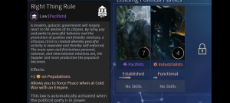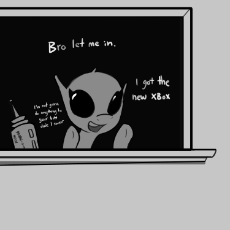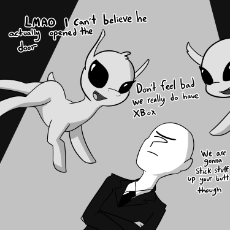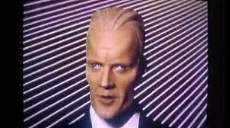Anyone else hate when dystopian authoritarian shit is presented as "the nice good thing" in science fiction? This is a social credit system. For it to operate it would require constant surveilance on your personal private life, and it would disproportionately reward sociopaths who figure out how to game the system.
This is from Endless Space 2. In this game this is the power of putting Pacifists in power. The power of putting warmongers in power? Jingoist Joy: Your people love you for starting wars instead of hating you for it. Despite how hard the tooltip tries calling your people armed banner-waving loons, it is the nicer, freer option. Does anyone involved in this game see the irony?
/cyb/ - Cyberpunk Fiction and Fact
Cyberpunk is the idea that technology will condemn us to a future of totalitarian nightmares here you can discuss recent events and how technology has been used to facilitate greater control by the elites, or works of fiction
14 replies | 5 files | 12 UUIDs | Page 6
1669565134.jpg (585.3 KB, 2400x1080, Screenshot_20221127-160138_Brave.jpg)

Anonymous
No.2266
Yeah, I hate it, but it's not exactly a new thing. In The Republic Plato calls for rather dystopian measures as a way to enforce "virtue." Rather disappointed that the developers of Endless Space 2 subscribe to this view, but there are quite a few people out there who see the world only in labels.
Anonymous
No.2712
1693735341.mp4 (4.3 MB, Resolution:640x480 Length:00:02:08, In 1985 James Burke predicted how politics will change in the digital age.mp4) [play once] [loop]

>>2265
>technological dystopian nightmare
Well, when the home computers begun to pop up, it was predicted in 1985 in prime time TV.
>technological dystopian nightmare
Well, when the home computers begun to pop up, it was predicted in 1985 in prime time TV.
>>2265
>Does anyone involved in this game see the irony?
Are you sure it's not by-design? They both look dystopian to me.
>Does anyone involved in this game see the irony?
Are you sure it's not by-design? They both look dystopian to me.
>>2717
It only makes sense that free people in space would hate other alien races and want alien resources more than they want alien friends. Every generation alien life spends existing is another generation where you risk someone violent and unstoppable coming to power and trying to conquer or enslave everyone or destroy the galaxy and potentially succeeding.
"Jingoist Joy", when selected, states your people are "banner-waving loons" who love war.
No coercive force to cause this is ever deployed.
No mention of "Unpersoning" insufficiently warlike people or a "Federal Bureau of Unpatriotic Action" with mass surveilance and limited power or indoctrinating people from birth with gaslighting and shaming and coercive force and the threat of violence. Not in this tooltip.
Libtards enforce their libtard orthodoxy with more coercive force than this.
"Rewarding people for being good" requires mass surveilance and a concrete definition of what goodness is and how to rank goodness if you don't want corrupt Bureau Of Goodness people reinterpreting the rules they enforce. And how the fuck would it give you the power to magically make enemy empires warring with you spontaneously declare an end to the war?
It only makes sense that free people in space would hate other alien races and want alien resources more than they want alien friends. Every generation alien life spends existing is another generation where you risk someone violent and unstoppable coming to power and trying to conquer or enslave everyone or destroy the galaxy and potentially succeeding.
"Jingoist Joy", when selected, states your people are "banner-waving loons" who love war.
No coercive force to cause this is ever deployed.
No mention of "Unpersoning" insufficiently warlike people or a "Federal Bureau of Unpatriotic Action" with mass surveilance and limited power or indoctrinating people from birth with gaslighting and shaming and coercive force and the threat of violence. Not in this tooltip.
Libtards enforce their libtard orthodoxy with more coercive force than this.
"Rewarding people for being good" requires mass surveilance and a concrete definition of what goodness is and how to rank goodness if you don't want corrupt Bureau Of Goodness people reinterpreting the rules they enforce. And how the fuck would it give you the power to magically make enemy empires warring with you spontaneously declare an end to the war?
>>2739
Not if those aliens are mares. You wouldn't do everything in your power to gain access to space mares? I'd sacrifice every human alive for the Imperium of Mare. A total mare cultural and diplomatic victory would be inevitable.
Not if those aliens are mares. You wouldn't do everything in your power to gain access to space mares? I'd sacrifice every human alive for the Imperium of Mare. A total mare cultural and diplomatic victory would be inevitable.
Anonymous
No.2742
>>2739
>want alien resources more than they want alien friends
At such a stage of interstellar exploration, most resources would be gained from asteroid mining.
Aliens would offer different kinds of capital, such as new technology and the experts and engineers to implement them, in which case you really would want alien friends.
Friendship is magic.
>want alien resources more than they want alien friends
At such a stage of interstellar exploration, most resources would be gained from asteroid mining.
Aliens would offer different kinds of capital, such as new technology and the experts and engineers to implement them, in which case you really would want alien friends.
Friendship is magic.
Anonymous
No.2743
>>2265
Positive authoritarianism is a shit idea. But for whatever reason, it seems to be perpetuated by either shitty writers whose only frame of reference is the TV show Person of Interest or their commie SJW social club.
But to be honest? What the fuck do you even call cyberpunk -without- Dystopic government? Sci-fi? Can a world built to be cyberpunk be (relatively) peaceful and friendly without need for an obligatory oppressive government? Hell, for some reason there are fiction authors that argue that some element of human-suffering is crucial to making a so-called-utopia, which the entire premise of is completely ridiculous, IMO.
Shit. the word "Utopia" itself basically means "non-existant city" or something like that. So, the entire idea is literally just a nothingburger that people treat as some sort of immutable law.
Honestly? I'm tired of Dystopia. I'm tired of it being used both positively and negatively. It's been too real for my tastes.
Positive authoritarianism is a shit idea. But for whatever reason, it seems to be perpetuated by either shitty writers whose only frame of reference is the TV show Person of Interest or their commie SJW social club.
But to be honest? What the fuck do you even call cyberpunk -without- Dystopic government? Sci-fi? Can a world built to be cyberpunk be (relatively) peaceful and friendly without need for an obligatory oppressive government? Hell, for some reason there are fiction authors that argue that some element of human-suffering is crucial to making a so-called-utopia, which the entire premise of is completely ridiculous, IMO.
Shit. the word "Utopia" itself basically means "non-existant city" or something like that. So, the entire idea is literally just a nothingburger that people treat as some sort of immutable law.
Honestly? I'm tired of Dystopia. I'm tired of it being used both positively and negatively. It's been too real for my tastes.
Anonymous
No.2802
>>2265
I can see where you're coming from. The tone in that description sounds positive, but think a little and it becomes depressingly cynical; making peace non-negotiable instead of genuinely fostering the sentiment.
Perhaps that's the point? I find it difficult to imagine some dude typing this out genuinely accepting the ideal, even moreso proofreading it. You'd think they'd tweak out the undertone of cynicism.
I can see where you're coming from. The tone in that description sounds positive, but think a little and it becomes depressingly cynical; making peace non-negotiable instead of genuinely fostering the sentiment.
Perhaps that's the point? I find it difficult to imagine some dude typing this out genuinely accepting the ideal, even moreso proofreading it. You'd think they'd tweak out the undertone of cynicism.
Anonymous
No.2803
>>2797
I find the issue of a utopia is they think too small. In the sheer scale they desire something of corruptible beginnings, middles and ends instead of higher beyond cosmic potentials.
At what point is too much too much?
I suppose instead of semi-realistic it's more of a paradise thought exercise. The point is there's usually a lack of something or an absence of an lack that should have been more heavily considered in detail.
I find the issue of a utopia is they think too small. In the sheer scale they desire something of corruptible beginnings, middles and ends instead of higher beyond cosmic potentials.
At what point is too much too much?
I suppose instead of semi-realistic it's more of a paradise thought exercise. The point is there's usually a lack of something or an absence of an lack that should have been more heavily considered in detail.
>>2797
>What the fuck do you even call cyberpunk -without- Dystopic government? Sci-fi? Can a world built to be cyberpunk be (relatively) peaceful and friendly without need for an obligatory oppressive government?
That's not what the word means. Cyberpunk is, to be precise, a smallish splinter sub-genre of sci-fi literature that has its origins in the late 1970s and which rose to prominence in the early 1980s.
Here's the pilot episode for a cyberpunk TV series, from 1985.
https://youtu.be/aZY-yQYVf38
Cyberpunk is inherently, by definition, about dystopia. It is, in fact, about a certain particular type of dystopia.
Let me back up a bit further. Cyberpunk was created in the late 1970s by five authors, four of whom were smug Canadian Boomer hippies:
William Gibson
Bruce Sterling
John Shirley
Pat Cadigan
Rudy Rucker
Rucker is an American professor of mathematics. He is a smug American hippie.
And these people viewed the war in Vietnam with considerable distaste, and viewed America, likewise, with considerable distaste. In the late 1970s they started writing brutally depressing and nihilistic sci-fi stories about the horrible future that's going to come Real Soon Now, which was all about environmental collapse, social collapse, the rise of lawless megacorporations, high-tech lowlifes down in the streets looking up a sky filled with General Electric death-ray satellites, and shaking their fists at The Man.
https://tvtropes.org/pmwiki/pmwiki.php/Quotes/Cyberpunk has some quotes that give some insight into the authors' mindset and what they meant to say.
The US elections of 1980 scared the absolute shit out of these people, causing them to drop all restraint on their loopy path. These people spent eight years absolutely convinced that Ronald Reagan was gonna blow up the world. They spent the balance of the decade writing stories about miserable people eking out their miserable existence in the radioactive rubble. Well, except for Rucker, who worked closely with the others and generally explored similar themes, but took everything to manic, blackly humorous extremes. His cyberpunk novels read like they were written in a collaboration with Robert Anton Wilson and maybe Kurt Vonnegut, if Vonnegut went on antidepressants.
https://archive.org/details/software0000ruck
One of the distinguishing traits of cyberpunk, incidentally, is that it depicts brutal, barbaric, might-makes-right societies in which there is no law, in which lawyers do not exist. This was their attempt at lampooning what they saw as the excessive lolbertarian tendencies of American society. To anyone from outside North America this is batshit insane. All around the world one of the main stereotypes of Americans is that they greet you by saying "I'll sue you" instead of "hello." America has been a nation of wannabee lawyers since the founding--read any early 19th Century British stories of the American "Cousin Jonathan," who is always trying to gain advantage by sea-lawyering. The "cyberpunk" authors set up a strawman that wasn't even recognizable and spent a decade beating it with literary sticks. An additional level of hilarity is revealed when we notice that, for all that they claimed they were doing this in the name of originality, Frederik Pohl and Cyril Kornbluth had covered this same ground over and over thirty years prior and had in fact trodden ruts into it.
https://archive.org/details/gladiatoratlaw0000pohl
https://archive.org/details/spacemerchants0000pohl_x2c3
https://www.gutenberg.org/files/52228/52228-h/52228-h.htm
And, see--one of the central concepts of cyberpunk is that it posited dystopian near-future worlds in which the Cold War had gone hot and somebody, probably Reagan, had blow'd up the world, real real good, and the stories were didactic guided tours of the miserable world the survivors inhabited. The Big Questions the genre was created to ask got answered with decisive finality when the Berlin Wall came down. In the New Century cyberpunk is every bit as dated as the black-and-white adventures of Captain Video and Flash Gordon. It is yesterday's future, just like Star Trek, just like the 1950s Heinlein "juveniles" the cyberpunk authors hated.
I will even say that if you accept the premise that science fiction, as a literary genre, if we're talking about the SRS BZNS of art, is about asking uncomfortable questions and getting us to think uncomfortable thoughts about the way things are and what's likely to happen in the near future, the most prescient, relevant science fiction novel for people living in Current Year isn't Neuromancer, it isn't Vacuum Flowers, and is sure as hell isn't The Handmaid's Tale. It isn't Snow Crash, either, though for all that it's a brutally funny parody and deconstruction of 1980s cyberpunk, it misses that particular mark also. No, if you want to read a speculative story about the near future that will make the hairs rise up on the back of your neck because you recognize so much of it from the news, the book you're looking for is The Turner Diaries. We're living in the prologue, all of us, right now. We're living in a world where all the stupid, ugly old A. Wyatt Mann cartoons came true, and they're not funny any more, not that they were ever very funny when it was possible to ignore them. Cyberpunk is as irrelevant, as a political statement or description of the world today, as the prewar E. E. Smith space adventure stories about the galactic empire administered by benevolent psychic supergenius "Lensmen," or Asimov's dry depictions of a collapsing Galactic Empire.
>What the fuck do you even call cyberpunk -without- Dystopic government? Sci-fi? Can a world built to be cyberpunk be (relatively) peaceful and friendly without need for an obligatory oppressive government?
That's not what the word means. Cyberpunk is, to be precise, a smallish splinter sub-genre of sci-fi literature that has its origins in the late 1970s and which rose to prominence in the early 1980s.
Here's the pilot episode for a cyberpunk TV series, from 1985.
https://youtu.be/aZY-yQYVf38
Cyberpunk is inherently, by definition, about dystopia. It is, in fact, about a certain particular type of dystopia.
Let me back up a bit further. Cyberpunk was created in the late 1970s by five authors, four of whom were smug Canadian Boomer hippies:
William Gibson
Bruce Sterling
John Shirley
Pat Cadigan
Rudy Rucker
Rucker is an American professor of mathematics. He is a smug American hippie.
And these people viewed the war in Vietnam with considerable distaste, and viewed America, likewise, with considerable distaste. In the late 1970s they started writing brutally depressing and nihilistic sci-fi stories about the horrible future that's going to come Real Soon Now, which was all about environmental collapse, social collapse, the rise of lawless megacorporations, high-tech lowlifes down in the streets looking up a sky filled with General Electric death-ray satellites, and shaking their fists at The Man.
https://tvtropes.org/pmwiki/pmwiki.php/Quotes/Cyberpunk has some quotes that give some insight into the authors' mindset and what they meant to say.
The US elections of 1980 scared the absolute shit out of these people, causing them to drop all restraint on their loopy path. These people spent eight years absolutely convinced that Ronald Reagan was gonna blow up the world. They spent the balance of the decade writing stories about miserable people eking out their miserable existence in the radioactive rubble. Well, except for Rucker, who worked closely with the others and generally explored similar themes, but took everything to manic, blackly humorous extremes. His cyberpunk novels read like they were written in a collaboration with Robert Anton Wilson and maybe Kurt Vonnegut, if Vonnegut went on antidepressants.
https://archive.org/details/software0000ruck
One of the distinguishing traits of cyberpunk, incidentally, is that it depicts brutal, barbaric, might-makes-right societies in which there is no law, in which lawyers do not exist. This was their attempt at lampooning what they saw as the excessive lolbertarian tendencies of American society. To anyone from outside North America this is batshit insane. All around the world one of the main stereotypes of Americans is that they greet you by saying "I'll sue you" instead of "hello." America has been a nation of wannabee lawyers since the founding--read any early 19th Century British stories of the American "Cousin Jonathan," who is always trying to gain advantage by sea-lawyering. The "cyberpunk" authors set up a strawman that wasn't even recognizable and spent a decade beating it with literary sticks. An additional level of hilarity is revealed when we notice that, for all that they claimed they were doing this in the name of originality, Frederik Pohl and Cyril Kornbluth had covered this same ground over and over thirty years prior and had in fact trodden ruts into it.
https://archive.org/details/gladiatoratlaw0000pohl
https://archive.org/details/spacemerchants0000pohl_x2c3
https://www.gutenberg.org/files/52228/52228-h/52228-h.htm
And, see--one of the central concepts of cyberpunk is that it posited dystopian near-future worlds in which the Cold War had gone hot and somebody, probably Reagan, had blow'd up the world, real real good, and the stories were didactic guided tours of the miserable world the survivors inhabited. The Big Questions the genre was created to ask got answered with decisive finality when the Berlin Wall came down. In the New Century cyberpunk is every bit as dated as the black-and-white adventures of Captain Video and Flash Gordon. It is yesterday's future, just like Star Trek, just like the 1950s Heinlein "juveniles" the cyberpunk authors hated.
I will even say that if you accept the premise that science fiction, as a literary genre, if we're talking about the SRS BZNS of art, is about asking uncomfortable questions and getting us to think uncomfortable thoughts about the way things are and what's likely to happen in the near future, the most prescient, relevant science fiction novel for people living in Current Year isn't Neuromancer, it isn't Vacuum Flowers, and is sure as hell isn't The Handmaid's Tale. It isn't Snow Crash, either, though for all that it's a brutally funny parody and deconstruction of 1980s cyberpunk, it misses that particular mark also. No, if you want to read a speculative story about the near future that will make the hairs rise up on the back of your neck because you recognize so much of it from the news, the book you're looking for is The Turner Diaries. We're living in the prologue, all of us, right now. We're living in a world where all the stupid, ugly old A. Wyatt Mann cartoons came true, and they're not funny any more, not that they were ever very funny when it was possible to ignore them. Cyberpunk is as irrelevant, as a political statement or description of the world today, as the prewar E. E. Smith space adventure stories about the galactic empire administered by benevolent psychic supergenius "Lensmen," or Asimov's dry depictions of a collapsing Galactic Empire.
Anonymous
No.3057
>>2797
>What the fuck do you even call cyberpunk -without- Dystopic government?
Iirc, cyberpunk is usually fully-privatized corporate-feudalism AnCapistan, recreational nukes and all.
>What the fuck do you even call cyberpunk -without- Dystopic government?
Iirc, cyberpunk is usually fully-privatized corporate-feudalism AnCapistan, recreational nukes and all.
Anonymous
No.3058
>>3056
>And, see--one of the central concepts of cyberpunk is that it posited dystopian near-future worlds in which the Cold War had gone hot and somebody, probably Reagan, had blow'd up the world, real real good, and the stories were didactic guided tours of the miserable world the survivors inhabited. The Big Questions the genre was created to ask got answered with decisive finality when the Berlin Wall came down. In the New Century cyberpunk is every bit as dated as the black-and-white adventures of Captain Video and Flash Gordon. It is yesterday's future, just like Star Trek, just like the 1950s Heinlein "juveniles" the cyberpunk authors hated.
Yeah, Cyberpunk really is pretty antiquated. We've already passed a lot of the dates in the original series without any of the cool technology.
A lot of the things that cyberpunk depicts were based on trends of the time. In cyberpunk, Japanese corporations like Arasaka rule large parts of the economy, because in the 1980s everyone thought that Toyota and Honda were going to take over the world with their fancy cars while American manufacturing was struggling (Americans even main Hundai as a cheap knockoff); and Japan was becoming a huge technological and cultural (anime) exporter in the world.
Some of them came true in part though. I'm cyberpunk, American and Jamaican niggers make up most of the slang terms, music and culture, because at the time Hip-Hop had just been invented and in the aftermath of the civil rights movement niggers were becoming major players in society and all the kids wanted to be black.
At the same time, cyberpunk predicted a surge in trannies and mental illness.
Overall, Cyberpunk as a genre has been based on technological optimism and social pessimism. Time delivered on the social decay, but not the technological progress.
>And, see--one of the central concepts of cyberpunk is that it posited dystopian near-future worlds in which the Cold War had gone hot and somebody, probably Reagan, had blow'd up the world, real real good, and the stories were didactic guided tours of the miserable world the survivors inhabited. The Big Questions the genre was created to ask got answered with decisive finality when the Berlin Wall came down. In the New Century cyberpunk is every bit as dated as the black-and-white adventures of Captain Video and Flash Gordon. It is yesterday's future, just like Star Trek, just like the 1950s Heinlein "juveniles" the cyberpunk authors hated.
Yeah, Cyberpunk really is pretty antiquated. We've already passed a lot of the dates in the original series without any of the cool technology.
A lot of the things that cyberpunk depicts were based on trends of the time. In cyberpunk, Japanese corporations like Arasaka rule large parts of the economy, because in the 1980s everyone thought that Toyota and Honda were going to take over the world with their fancy cars while American manufacturing was struggling (Americans even main Hundai as a cheap knockoff); and Japan was becoming a huge technological and cultural (anime) exporter in the world.
Some of them came true in part though. I'm cyberpunk, American and Jamaican niggers make up most of the slang terms, music and culture, because at the time Hip-Hop had just been invented and in the aftermath of the civil rights movement niggers were becoming major players in society and all the kids wanted to be black.
At the same time, cyberpunk predicted a surge in trannies and mental illness.
Overall, Cyberpunk as a genre has been based on technological optimism and social pessimism. Time delivered on the social decay, but not the technological progress.


